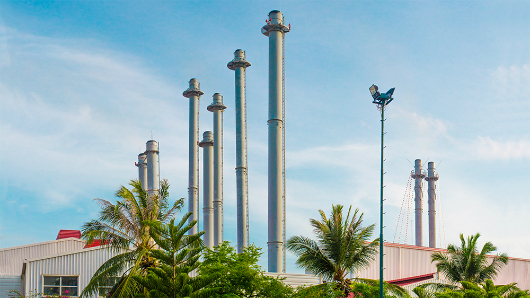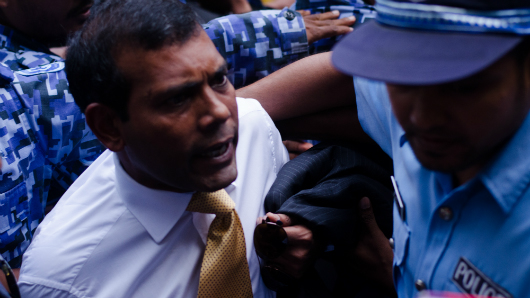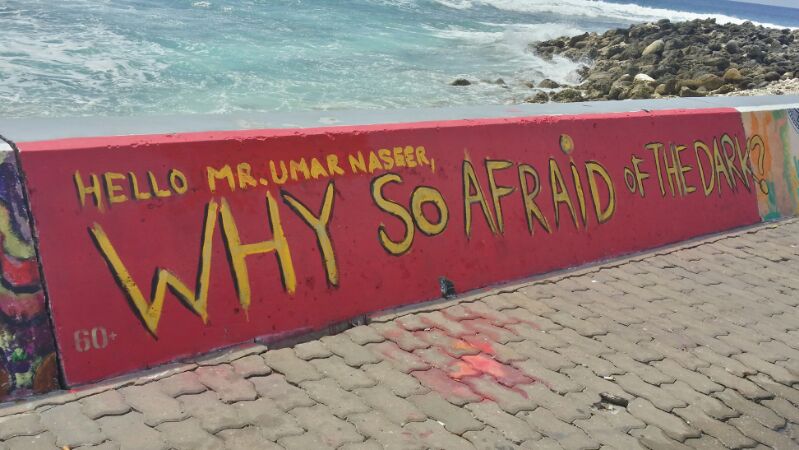The government has barred ex-president Mohamed Nasheed from the Maldivian Democratic Party he co-founded by using its parliamentary majority to pass a law banning prisoners from political party membership.
Nasheed will lose his leadership and membership of the MDP because of a terrorism conviction this month relating to the detention of a judge during his period in power.
He was jailed for 13 years after being found guilty of terrorism in a case that his party says represented a politically-led campaign against him by the government of President Abdulla Yameen.
MDP MPs did not take part in the vote, but protested on the Majlis floor as deputy Speaker ‘Reeko’ Moosa Manik announced the vote, using megaphones and sirens to make his voice inaudible. The ruling Progressive Party of the Maldives has a strong majority in any case.
The law was passed by 42 votes in favour, with just two against.
Speaking to the press, MDP chairperson Ali Waheed said the party would not accept the amendment and would choose its own leader. Nasheed remains the MDP’s presidential candidate, the party has said, despite his jail sentence.
“The government, because they have absolute power, is trying to wipe out all political rivals. Note this, they will eventually try to disband the MDP. But how can they get rid of what is in our hearts?” Waheed said.
MDP MP Eva Abdulla said the party would not accept the government using the Majlis as “an extension of its tyranny to strip us of our democratic rights.”
“No amount of backtracking can strip him of the fact he formed the first political party in the country and became its first democratically elected leader. Or the fact that those who vote for this amendment today would not be in a political party if not for the hard work of this man to win them that freedom,” she told Minivan News.
Eva said the Majlis was being conducted unconstitutionally as standing orders prohibit sittings from going ahead without order on the floor. The MDP has been protesting on the floor at every sitting since March 2, and has said it will not stop until the government releases Nasheed.
The bill was never debated in parliament due to opposition protests, while PPM MPs were not responding to calls at the time of going to press.
The two MPs who voted against the amendment to the 2013 Prisons and Parole Act are Adhaalath Party MP Anara Naeem and Nolhivaram MP Hussein Areef, who recently resigned from the PPM.
The Adhaalath Party this month withdrew support for President Yameen’s administration, saying he was acting to eliminate political rivals, and instead formed an alliance with the MDP.
The amendment also bars prisoners from holding membership or leadership in non-governmental organizations for the duration of their prison term.
At an MDP protest outside the Majlis, Aminath Rasheedha, 47, said: “Yameen’s corrupt and unlawful government cannot decide who our presidential candidate is. That is for us to decide. Our president and leader will always be Mohamed Nasheed.”

Separately, the ruling PPM has also submitted an amendment to the law on privileges for former presidents stripping any president who resigned – as Nasheed did, although he said it was under duress – from army protection and financial privileges.
Tensions are high in Malé, with the opposition’s daily protests now entering their seventh consecutive week. The police last week threatened to crackdown on protesters, claiming they were inciting violence and assaulting police officers.
Observers including the UN and Amnesty International have condemned Nasheed’s trial. Amnesty called it a travesty of justice, while the UN said it made a mockery of the constitution and international treaties.
Likes (0)Dislikes
(0)Dislikes (0)
(0) 







